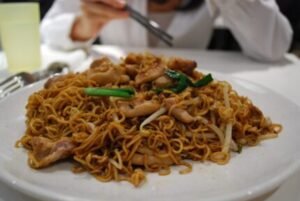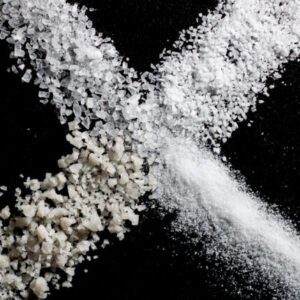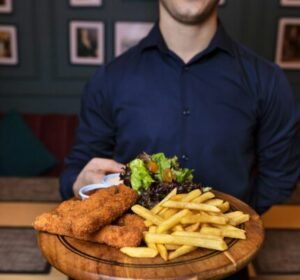Medically reviewed by Dr. Ramesh Gaddam, M.D. — Written by Sumalatha, D.N.H.E
Table of Contents
ToggleWhen taking Flecainide, a medicine for irregular heartbeats, watching what you eat is important. Some foods and drinks can stop the medicine from working properly or cause unwanted side effects.
Avoiding salty foods, grapefruit, alcohol, and caffeine helps Flecainide keep your heart beating steadily.
Knowing which foods to avoid can help you stay healthier while on this medication and make sure it works as it should.
Foods to Avoid
What you eat can affect how well Flecainide works and may cause side effects. Eating the right foods can help the medicine work better and lower risks.
Following are the foods to avoid while taking Flecainide.
1. High-Sodium Foods
Eating foods high in salt can raise your blood pressure and make heart problems worse, especially if you’re taking Flecainide.
Some common high-sodium foods include processed meats like bacon and sausages, canned soups, salty snacks, and fast food.
To help keep your heart healthy, try to choose foods with less salt and use fresh ingredients whenever possible.
This can make Flecainide work better and help avoid extra stress on your heart.
2. Grapefruit and Grapefruit Juice
Grapefruit and grapefruit juice can interfere with how your body processes Flecainide, which may cause the medication to build up in your blood and increase the chances of side effects.
To avoid this, it’s best to skip grapefruit and opt for other fruits or drinks.
Good alternatives include apple juice, cranberry juice, or non-citrus fruits like pears and berries.
These options are safer and won’t affect how Flecainide works in your body.
3. Alcohol
Drinking alcohol while taking Flecainide can make side effects worse, such as dizziness, irregular heartbeats, and feeling sleepy.
To stay safe, it’s best to limit how much alcohol you drink or avoid it altogether.
If you’re unsure how much is safe for you, talk to your doctor for advice based on your personal health.
4. Caffeine-Containing Foods and Beverages
Caffeine can make your heart beat faster, which goes against the goal of Flecainide, a medicine that helps keep your heart rhythm steady.
Foods and drinks with caffeine, like coffee, black tea, energy drinks, and chocolate, can overstimulate your heart.
To help Flecainide work better, it’s a good idea to cut back or avoid caffeine altogether.
This can help keep your heart calm and steady while you’re on the medication.
5. Herbal Supplements
Some herbal supplements can interfere with how your body processes Flecainide, making the medicine less effective or causing harmful effects.
For example, St. John’s Wort can change how Flecainide is broken down, ginseng may raise your heart rate, and licorice root can affect your heart rhythm.
It’s important to talk to your healthcare provider before taking any herbal supplements to make sure they won’t interfere with your medication.
6. Foods High in Potassium
While potassium-rich foods are usually good for your heart, too much potassium can sometimes affect your heart’s rhythm, especially if you have kidney problems.
Foods high in potassium, like bananas, oranges, and potatoes, are generally safe unless your doctor advises otherwise.
It’s always best to check with your healthcare provider to see if you need to limit your potassium intake while taking Flecainide.
7. Foods High in Unhealthy Fats
Foods high in unhealthy fats can lead to heart problems, which is not ideal when taking Flecainide.
These foods include fried items, fast food, and certain baked goods.
To support heart health, try to limit these foods and choose healthier fats like those found in nuts, seeds, and avocados.
8. Ultra-Processed Foods

Ultra-processed foods, such as packaged snacks, instant noodles, and sugary cereals, can be harmful to your heart and may interfere with Flecainide.
These foods often contain added sugars, unhealthy fats, and preservatives.
Opt for whole, fresh foods to help maintain a healthy heart while on medication.
9. Sugary Drinks
Drinks high in sugar, like soda, sweetened teas, and energy drinks, can raise blood sugar levels and contribute to weight gain, which may worsen heart health.
It’s best to limit these drinks and choose water, herbal tea, or naturally flavored drinks instead.
Other Dietary Considerations
Staying well-hydrated is important for your heart health and helps Flecainide work properly.
Make sure to drink plenty of water throughout the day and try to limit sugary drinks and those with caffeine.
Eating a healthy diet full of fruits, vegetables, lean proteins, and whole grains can help Flecainide work better.
Foods like leafy greens, berries, fish, and whole grains support a healthy heart.
It’s important to talk to your doctor about any changes in your diet, supplements, or potential food interactions.
They can give you personalized advice based on your specific needs, especially if you have any health conditions that require special attention.
How Flecainide Works?
Flecainide helps control the electrical signals in the heart to keep a steady rhythm.
It works by blocking sodium channels, which slows down any irregular signals in the heart.
Some foods can change how Flecainide is absorbed and processed in the body.
This means certain foods might increase the chance of side effects or make the medicine less effective.
Monitoring for Side Effects
You may experience symptoms like dizziness, nausea, an uneven heartbeat, or chest discomfort if certain foods interact negatively with Flecainide.
If your side effects get worse or if you notice new symptoms after eating specific foods, contact your doctor right away.
Keep track of what you eat and any side effects you notice afterward.
This can help you and your healthcare provider understand how your diet affects your treatment.
Key Takeaways
- Watch Your Diet: The foods you eat can affect how well Flecainide works. Choosing the right foods is important.
- Foods to Avoid: Stay away from high-sodium foods, grapefruit, alcohol, caffeine, unhealthy fats, and certain herbal supplements to help Flecainide work better.
- Stay Hydrated: Drinking enough water is good for your heart and helps Flecainide work properly.
- Eat a Balanced Diet: A healthy diet with plenty of fruits, vegetables, lean meats, and whole grains can improve how Flecainide works.
- Talk to Your Doctor: Always check with your healthcare provider before making any diet changes or taking supplements.
- Watch for Side Effects: Be alert for any side effects from food interactions. Keep track of what you eat and any symptoms you feel. Contact your doctor if you notice any problems.
- Follow Your Dosage: Stick to the dose your doctor gives you and don’t change it without their advice, as this can affect your treatment.
Frequently Asked Questions (FAQs)
What Can You Not Take with Flecainide?
Avoid grapefruit, alcohol, caffeine, and certain herbal supplements while taking Flecainide, as they can interfere with the medication’s effectiveness or increase side effects.
Can I Drink Milk While Taking Flecainide?
Yes, you can drink milk while taking Flecainide. It does not affect how the medication works.
When Should You Avoid Flecainide?
Avoid Flecainide if you have certain heart conditions, allergies to the medication, or severe kidney issues. Always consult your doctor for advice tailored to your situation.
Why Is Flecainide High Risk?
Flecainide can be high risk because it may cause serious heart rhythm problems, especially in people with certain heart conditions. Regular monitoring is important.
Can Flecainide Damage Kidneys?
Flecainide may affect kidney function in some people, especially those with existing kidney problems. It’s important to have your kidney function checked regularly.
How Successful Is Flecainide?
Flecainide can be very effective for controlling abnormal heart rhythms in many patients, but success varies based on individual health conditions.
How Long Can a Person Stay on Flecainide?
A person can stay on Flecainide as long as their doctor recommends and monitors their condition. Regular check-ups are important.
How Much Flecainide Is Safe?
The safe dose of Flecainide depends on individual health and is determined by your doctor. It’s important to follow their instructions carefully.
What Can I Take Instead of Flecainide?
Alternatives to Flecainide may include other antiarrhythmic medications, but you should discuss these options with your doctor.
What Is the Safest Antiarrhythmic Drug?
There are several antiarrhythmic drugs, and the safest option can vary based on individual health. Your doctor can recommend the best choice for you.
What Is the Safest Beta Blocker?
The safest beta blocker will depend on your health needs. Common options include metoprolol and atenolol, but you should consult your doctor for guidance.
Who Can’t Take Flecainide?
People with certain heart conditions, severe allergies to the drug, or significant kidney problems should not take Flecainide. Always check with your doctor.
Why Would a Doctor Prescribe Flecainide?
A doctor may prescribe Flecainide to help control irregular heartbeats and improve heart rhythm in patients with specific heart conditions.
Does Flecainide Affect Blood Pressure?
Flecainide may lower blood pressure in some people, but this effect can vary. Monitoring your blood pressure while on this medication is important.
Why Is Flecainide Not Working?
If Flecainide is not working, it may be due to the dosage, interactions with other medications, or individual health factors. Consult your doctor for advice.
Can You Suddenly Stop Flecainide?
You should not suddenly stop taking Flecainide without consulting your doctor, as this can lead to serious health risks.
Can You Exercise on Flecainide?
You can usually exercise while taking Flecainide, but it’s important to talk to your doctor about any specific restrictions based on your health.
Can Flecainide Restore Heart Rhythm?
Flecainide can help restore a normal heart rhythm in many patients with specific heart conditions.
Can Heart Rhythm Go Back to Normal?
Yes, in many cases, Flecainide can help restore a normal heart rhythm, but this depends on the individual’s health and condition.
What Is the Permanent Solution for Arrhythmias?
Permanent solutions for arrhythmias may include procedures like ablation, implanting devices like pacemakers, or other treatments. Consult your doctor for options.
Can I Take Flecainide Once a Day?
Flecainide dosing is typically twice a day, but your doctor may adjust it based on your needs. Always follow their guidance.
Can I Reduce My Flecainide?
You should not reduce your Flecainide dosage without talking to your doctor, as this can affect your heart rhythm.
Can Flecainide Affect Your Kidneys?
Flecainide may affect kidney function in some patients, especially those with existing kidney issues. Regular check-ups are essential.
Can I Cut Flecainide in Half?
You should not cut Flecainide tablets without consulting your doctor first, as it may affect how the medication works.
What Are the Symptoms of Too Much Flecainide?
Symptoms of too much Flecainide may include dizziness, confusion, blurry vision, or irregular heartbeats. If you notice these signs, contact your doctor.
Why Take Flecainide on an Empty Stomach?
Taking Flecainide on an empty stomach can help the body absorb the medication more effectively, but follow your doctor’s instructions.
Can Flecainide Lower Blood Pressure?
Flecainide can lower blood pressure in some people, but this effect may vary. Monitoring your blood pressure while on this medication is important.
References
[1] https://www.healthcentral.com/condition/atrial-fibrillation/afib-diet
[2] https://www.healthline.com/health/atrial-fibrillation/foods-to-avoid
[3] https://www.apollopharmacy.in/salt/FLECAINIDE%20ACETATE
[4] https://www.webmd.com/drugs/2/drug-6109/flecainide-oral/details
[5] https://my.clevelandclinic.org/health/drugs/17006-antiarrhythmic-medications-flecainide
[6] https://www.mayoclinic.org/drugs-supplements/flecainide-oral-route/before-using/drg-20063854
[7] https://www.mayoclinic.org/drugs-supplements/flecainide-oral-route/precautions/drg-20063854?p=1
[8] https://my.clevelandclinic.org/health/drugs/20452-flecainide-tablets
Also Read:
Medically reviewed by Dr. Ramesh Gaddam, M.D.

General Physician, Diabetologist, and Critical Care Specialist.








